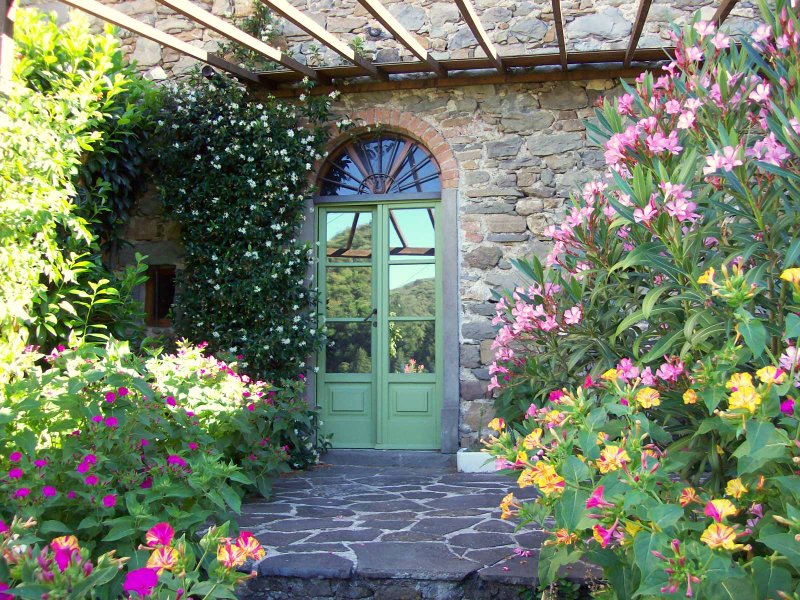The sweltering heat of summer has finally passed and I now have a window of opportunity to get some of those outdoor jobs done before the rain sets in.

La porta a vetri con la sua nuova mano di colore. The French windows with their new coat of colour. Photo by Geoff.
Fai Da Te (D.I.Y.)
I have a long list of such jobs:
- carteggiare e verniciare la carpenteria esterna (sand and paint the external woodwork)
- far portare la legna e accatastarla per l’inverno (have the wood brought and stack it up for the winter)
- ricostruire i pezzi di muri crollati (rebuild the parts of walls that have fallen)
- potare i cespugli e gli alberi (prune the bushes and trees)
Well, that’s enough to be getting on with for now!
The priority has to be the external woodwork, much of which catches the full force of the sun, enemy of paintwork.
Allora, cosa mi serve per questo lavoro? (Now, what do I need for this job?)
Ecco la mia lista: (Here’s my list:)
vernice (paint)
pennelli (brushes)
acquaragia (white spirit/turpentine)
carta vetrata (sand/glasspaper)
banco di lavoro (workbench)
stucco (stucco/wood filler)
Su, incominciamo! (Right, let’s get started!)
Vado dal ferramenta per far fare il colore giusto, abbiamo scelto un verde chiaro tradizionale (I go to ironmongers to have the right colour made up, we’ve chosen a traditional light green)
Già che ci sono compro due metri di carta vetrata (whilst I’m there I buy two metres of sandpaper)
I pennelli ce li ho già a casa (I’ve already got the brushes at home)
Tolgo le finestre dagli infissi e le appoggio sul banco di lavoro. Così lavoro molto meglio! (I remove the windows from their frames and lay them on the workbench. I can work much better like this!)
Adesso comincio a carteggiare la carpenteria (now I begin to sand down the woodwork)
Poi devo togliere la polvere con uno straccio e passare l’aspirapolvere (then I have to remove the dust with a rag and vacuum)
Trovo qualche crepa da stuccare (I find some cracks to fill)
Quando lo stucco è asciutto ripasso con la carta vetrata (when the filler is dry I sand it down again)
Ora posso cominciare a verniciare (now I can begin painting)
Per le finestre uso un pennello abbastanza fine, di circa due centimetri (for the windows I use a fairly narrow brush, about two centimetres wide)
Ecco finito! (that’s that done!)
Però devo ancora pulire i pennelli con l’acquaragia e un vecchio straccio (However I still have to clean the brushes with white spirit and an old rag)
Devo ammettere che non è mica il mio lavoro preferito, comunque ora la carpenteria sta decisamente meglio (I must admit that this really isn’t my favourite job, however the woodwork definitely looks better now)


Comments:
Ann:
Caro Geoff,
Era molto interessante il fai da te in italiano, come al solito, grazie.
Communque ho una richiesta. Potrei utilizare il tuo bello foto per dipingerlo? Il mio hobby preferito è dipingere, quando non faccio il giardinaggio o imparo l’italiano. Ammetto che il verniciare non mi piace per niente!
Ciao
Ann
Geoff:
@Ann Ciao Ann, se vuoi usare la foto come ispirazione per un quadro fai pure, non c’è problema.
A presto, Geoff 🙂
Phil:
Geoff,
Penso che “la porta a vetri” in inglese sia “French doors”, vero?
Grazie e ciao!
Phil
Mike Rose:
Potrebbe continuare con questa tema? Perche’ passo la maggior parte della mia vita con “fai da te” nel nostro rustico e terreno nelle colline di Galles. Trenta anni fa abbiamo piantato un bosco d’un centinaio d’alberi e poi le usiamo per la stufa di legno. Rimettiamo a posto ogni albero e cerchiamo non spreccare qualcosa..
Geoff:
@Mike Rose Ciao Mike, sarà fatto! A presto, Geoff
Stefano:
Brava per il suo buon lavoro. Puoi spiegarci l’uso di “far fare” qualsisasi. Grazie. Steven
Geoff:
@Stefano Ciao Stefano!
Innanzitutto sono maschio io, quindi dovevi scrivere bravo, non brava 😉
Allora, per quanto riguarda l’uso di far fare. Far fare vuol dire ‘to have done/made’, e.g.: mi sono fatto fare un bel maglione da Serena (I had a nice sweater made for myself by Serena). Ieri mi sono fatto tagliare i cappelli (yesterday I had my hair cut). Devo far aggiustare la macchina (I have to have the car fixed)
Infatti, fare ha un sacco di significati, ti consiglio di leggere i seguenti blog:
https://blogs.transparent.com/italian/idiomatic-expressions-with-the-italian-verb-fare-part-1/
https://blogs.transparent.com/italian/idiomatic-expressions-with-the-italian-verb-fare-part-2/
Saluti da Geoff 🙂
Lesley Brennan:
E’ la tua entrata? E’ bellissima e mi piace molto il colore verde chiaro.
Rosalind:
Non so chi ha sistemato questa maravigliosa terrazza: Serena, Geoff oppure proprietarii passati ma avrei bisogno della loro ispirazione per il mio giardino, soprattutto adesso che ho perso la mia palma per via del punteruolo delle palme.
Geoff:
@Rosalind Ciao Rosalind, sono stato io a sistemare il terrazzo. Prima non c’era. Vedi il mio nuovo blog.
A presto, Geoff 🙂